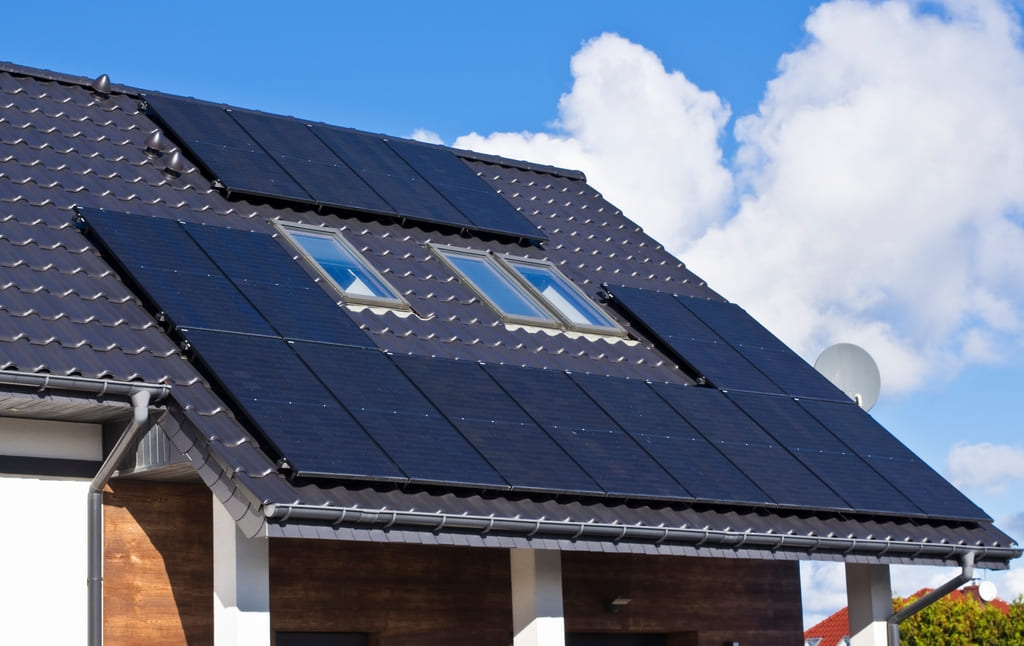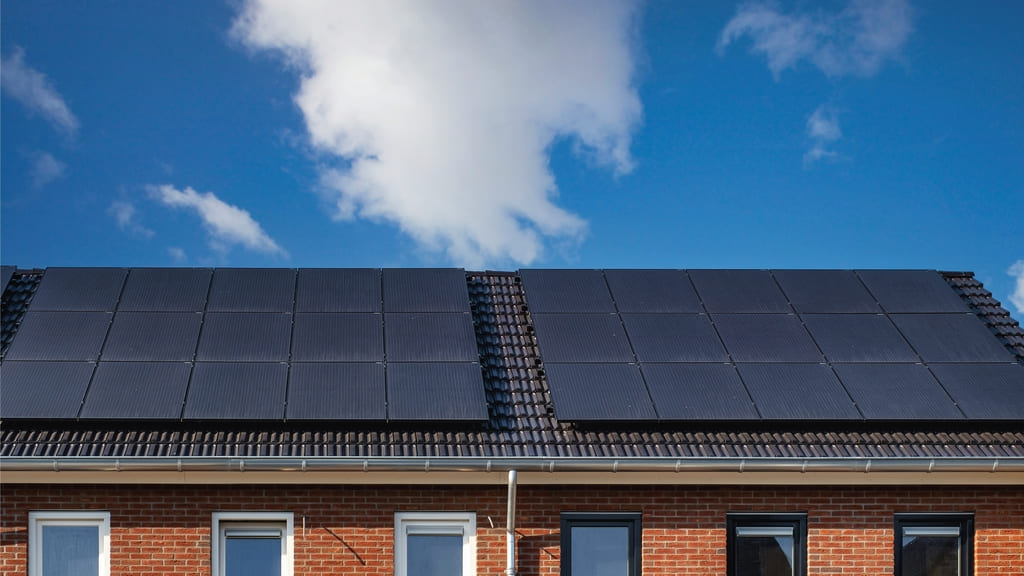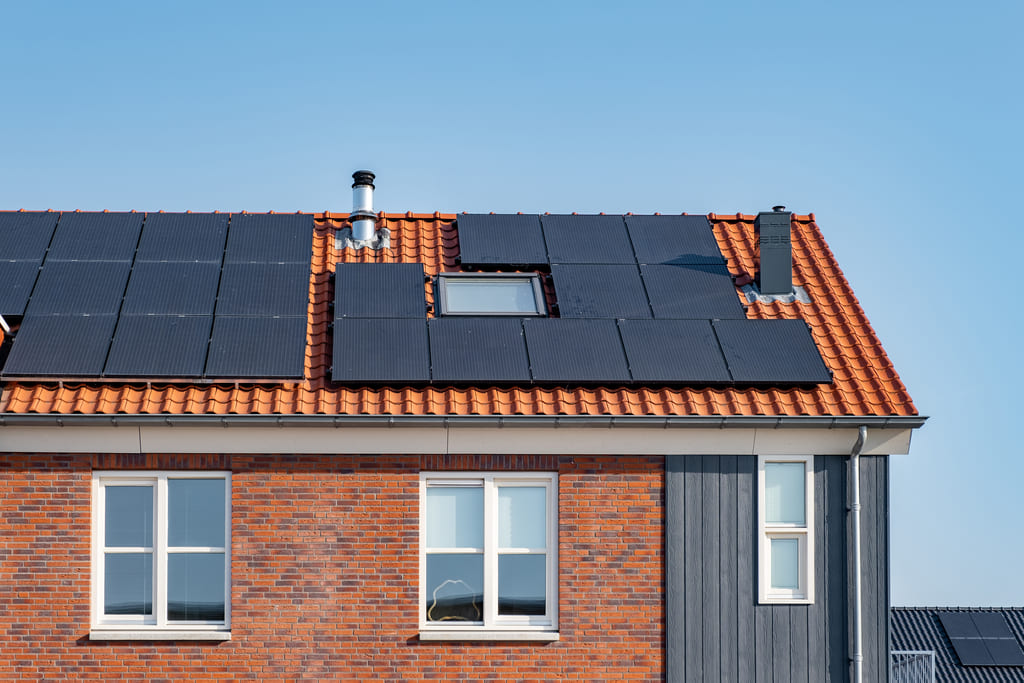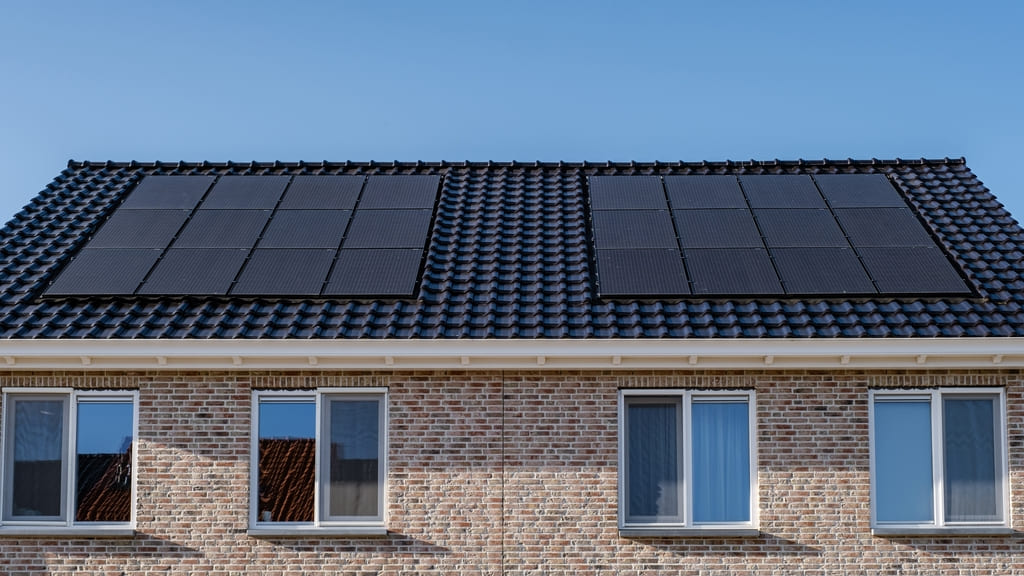Home solar installations have become increasingly popular in recent years as people strive to reduce their carbon footprint and save on energy costs. With advancements in technology, artificial intelligence (AI) is now being used to revolutionize the process of installing and maintaining solar panels on residential properties.
From site selection to design and layout, estimating energy production to real-time monitoring and maintenance, AI is transforming the way home solar installations are being carried out. In this article, we’ll explore how AI is being used in home solar installations, the benefits it brings, the challenges of implementation, and how it can help drive faster and cheaper installations.
Key Takeaways:
- AI streamlines the process of home solar installation, reducing costs and human error while improving efficiency and productivity.
- Optimal design and layout for maximum energy production is made possible with AI, resulting in faster and more accurate site selection.
- Real-time monitoring and maintenance using AI technology lowers costs for homeowners and ensures the system operates at its full potential.
How Is AI Used in Home Solar Installations?
Artificial Intelligence (AI) plays a pivotal role in revolutionizing home solar installations by leveraging advanced algorithms and data analytics to optimize every aspect of the process, from site selection to monitoring and maintenance.
AI’s impact on site selection is particularly noteworthy, as it utilizes machine learning to analyze various factors such as roof orientation, shading patterns, and weather conditions, ensuring the optimal placement of solar panels for maximum energy capture.
In the design phase, AI algorithms can create customized solar panel layouts based on specific roof characteristics and energy consumption patterns, maximizing energy production.
Site Selection
The use of AI in site selection for home solar installations involves the integration of cutting-edge technology, advanced algorithms, and real-time data insights to identify the most optimal locations for solar panel deployment with unprecedented precision and efficiency.
Artificial intelligence (AI) plays a pivotal role in revolutionizing the process of choosing ideal sites for home solar installations. This is achieved by leveraging a combination of sensors, data analytics, and operational insights.
These technological components work in synergy to gather and process an extensive array of real-time data, including sun exposure, weather patterns, and geographical features. This allows for the identification of optimal locations for solar panel deployment.
By employing AI, the entire site selection process becomes highly refined, offering a level of precision and efficiency previously unattainable through traditional methods.
Design and Layout
AI-driven design and layout processes for home solar installations focus on maximizing energy efficiency and optimization through the utilization of sophisticated models, technology-driven solutions, and predictive algorithms to create the most effective solar panel configurations tailored to each specific environment.
This cutting-edge approach harnesses artificial intelligence (AI) to analyze a multitude of variables, such as the angle of incidence, geographic location, weather patterns, and shading, to determine the optimal placement and configuration of solar panels, thereby increasing energy production and cost-effectiveness.
By incorporating AI, solar companies can develop predictive models to forecast energy generation, identify potential performance issues before they arise, and continuously optimize the system’s performance, leading to overall improved reliability and output.
Estimating Energy Production
AI enhances the estimation of energy production in home solar installations by incorporating advanced forecasting techniques, real-time solar power data, and renewable energy insights to provide accurate predictions of electricity generation potential, enabling well-considered choices and performance optimization.
By utilizing machine learning algorithms, AI analyzes historical and real-time energy data, weather patterns, and other pertinent variables to generate precise forecasts.
These forecasts not only assist in determining the optimal placement and capacity of solar panels, but also aid in planning for potential electricity surpluses or deficits.
AI’s ability to interpret renewable energy insights allows for a comprehensive understanding of how natural elements impact energy production, leading to more effective strategies for integration and utilization of solar power.
Predicting Shading
AI-driven shading prediction mechanisms in home solar installations leverage predictive algorithms, sensor technologies, and operational insights to accurately forecast and mitigate the impact of shading on solar panel efficiency, ensuring optimal performance and generation capabilities.
These advanced AI algorithms analyze historical weather patterns, local geography, and specific installation configurations to predict precise shading patterns throughout the day and year. By incorporating real-time data from advanced sensor technologies embedded within the solar panels, AI can dynamically adjust the positioning and orientation of the panels to maximize sunlight exposure, significantly increasing overall energy production.
AI provides operational insights by continuously monitoring and optimizing panel performance, alerting homeowners and maintenance teams to potential issues such as obstructions or malfunctions. This proactive approach minimizes downtime and ensures consistent power generation, ultimately enhancing the long-term reliability and efficiency of residential solar systems.
Monitoring and Maintenance
AI-powered monitoring and maintenance systems for home solar installations provide real-time operational insights, predictive maintenance capabilities, and sensor-driven advantages to ensure peak system performance, reliability, and longevity, offering proactive solutions for optimal energy generation and system control.
These advanced systems employ artificial intelligence to continuously analyze and interpret data from various sensors, optimizing the efficiency and effectiveness of solar installations.
By utilizing the strength of AI, homeowners can benefit from accurate performance forecasts, timely fault detection, and precise asset management, ultimately leading to reduced downtime and enhanced energy output. AI enables automated anomaly detection, enabling early identification of potential issues, thereby facilitating efficient and cost-effective preventive maintenance.
In essence, the integration of AI in solar monitoring and maintenance not only streamlines operations but also maximizes the overall performance and longevity of home solar systems.
What Are the Benefits of Using AI in Home Solar Installations?
The integration of AI in home solar installations brings forth a multitude of benefits, including cost savings, enhanced system reliability, and innovative solutions that optimize the utilization of renewable energy resources, revolutionizing the efficiency and performance of solar power systems.
With the application of AI, homeowners can experience substantial reductions in their energy bills as the technology analyzes consumption patterns and optimizes energy production, thereby increasing cost savings.
AI ensures system reliability by detecting and resolving potential issues before they escalate, enhancing the overall performance and longevity of the solar installation.
AI-driven algorithms can adapt to changing environmental conditions, thereby maximizing energy yield and mitigating the impact of intermittency associated with solar power. This not only enhances the system’s stability but also contributes to a more sustainable and reliable energy source for residential properties.
The integration of AI in solar installations not only transforms the way energy is utilized but also paves the way for a more resilient, efficient, and environmentally friendly approach to harnessing renewable power for homes.
Faster and More Accurate Site Selection
AI-driven site selection processes facilitate faster and more accurate decisions for home solar installations, leveraging predictive technology and operator performance to optimize the identification of ideal solar panel deployment locations with unprecedented precision and efficiency.
By utilizing the strength of artificial intelligence, companies can streamline the process of site selection, leading to significant cost savings and quicker project timelines. This advanced technology enables the analysis of vast datasets, allowing for the identification of optimal locations based on factors such as sunlight exposure, topography, and potential shading.
AI can enhance operational performance by automating repetitive tasks, reducing human error, and ensuring consistent results. The integration of AI into site selection processes give the power tos companies to make data-driven decisions, harnessing the immense processing power of AI to meticulously assess various parameters and variables that impact solar panel deployment. This technological advancement revolutionizes the industry by offering unparalleled efficiency and accuracy, ultimately accelerating the adoption of sustainable energy solutions.
Optimal Design and Layout for Maximum Energy Production
AI facilitates the creation of optimal design and layout configurations for maximum energy production in home solar installations by utilizing advanced models, optimization techniques, and sensor-driven insights to ensure the efficient utilization of available solar resources and enhanced electricity generation capabilities.
To achieve this, AI algorithms analyze various factors such as the geographical location of the installation, local weather patterns, shading effects, and panel orientation to optimize the placement and tilt angles of solar panels for enhanced sunlight absorption and electricity generation.
AI helps in predicting the energy output based on historical data and real-time monitoring, allowing for proactive maintenance and adjustments to maximize output. By integrating AI into solar design and planning, homeowners can make informed decisions and reap the benefits of sustainable, cost-effective energy generation.
Real-Time Monitoring and Maintenance
AI-enabled real-time monitoring and maintenance mechanisms in home solar installations offer proactive solutions, predictive maintenance capabilities, and sensor-driven advantages, ensuring continuous system optimization, operational efficiency, and longevity for sustained energy generation and reliability.
These mechanisms harness the power of artificial intelligence to predict and prevent potential issues before they escalate, minimizing downtime and optimizing performance. By leveraging advanced analytics, they can detect anomalies, identify patterns, and continuously learn from data to enhance operational effectiveness.
The seamless integration of AI with sensor technology enables precise and timely fault detection, allowing for swift corrective measures and preventing costly system disruptions. This proactive approach not only minimizes maintenance costs but also maximizes the lifespan of the solar installation, contributing to a more sustainable and reliable energy supply.
Cost Savings
The integration of AI leads to significant cost savings in home solar installations through consumption optimization, data analysis, and efficiency benefits, offering homeowners an economically advantageous approach to renewable energy adoption and long-term electricity generation.
By leveraging AI, home solar systems can intelligently adjust energy consumption based on the household’s needs and patterns, ultimately reducing wastage and optimizing the use of solar power.
AI-driven data analysis enables precise forecasting of energy requirements, leading to more efficient utilization of solar resources and minimizing electricity costs over time. The seamless integration of AI technology into home solar installations not only promotes sustainability but also give the power tos homeowners to make informed energy decisions that align with their budget and environmental goals.
What Are the Challenges of Implementing AI in Home Solar Installations?
Despite its transformative potential, implementing AI in home solar installations presents several challenges, encompassing initial costs, data privacy concerns, security considerations, and the integration with existing generation systems, requiring comprehensive strategies for successful adoption and operation.
Initial costs can be a significant barrier for homeowners considering AI-powered solar installations. While the long-term benefits are promising, the upfront investment can be daunting.
Data privacy is a crucial issue, with AI systems requiring access to sensitive consumption and generation data. Managing this data while ensuring privacy protections presents a complex challenge.
Integrating AI into existing solar generation systems demands careful planning to avoid disruptions and ensure seamless operation. Security concerns also loom large, as AI systems must be fortified against cyber threats to safeguard the entire solar infrastructure.
Initial Costs and Training
The initial costs and training requirements for AI implementation in home solar installations pose significant challenges, necessitating investments in technology, environmental considerations, and comprehensive training programs to ensure seamless integration and operational effectiveness.
When considering implementing AI technology, homeowners must carefully assess their budget and potential return on investment. The environmental impact of a solar AI system should also be factored in, as sustainability and eco-friendliness are crucial considerations.
Additionally, specialized training is necessary for effectively operating and maintaining AI-powered solar systems. It’s essential to have training programs tailored to the specific technology and its integration with solar installations to equip technicians and homeowners with the necessary skills and knowledge.
Data Privacy and Security Concerns
Data privacy and security concerns surrounding AI integration in home solar installations demand robust technological safeguards, sensor-driven security measures, and seamless integration with existing systems to mitigate potential vulnerabilities and safeguard sensitive operational data.
One of the primary challenges in adopting AI for home solar installations lies in ensuring that the data privacy and security measures are at par with the advancements in technology. With the proliferation of connected devices and the volume of data being exchanged, the need for technological safeguards becomes essential to protect against cyber threats and unauthorized access.
Integrating sensor-driven security measures to monitor the functioning and data flow within the solar installation infrastructure is crucial for identifying and addressing any potential breaches in data privacy and security. This requires the deployment of advanced sensors and data analytics to continuously assess and respond to any anomalous activities.
Achieving seamless integration with the existing systems and technologies in place is imperative to ensure that potential vulnerabilities are minimized, and the overall operational data is protected from unauthorized access or misuse. The harmonious amalgamation of AI technology with the existing solar infrastructure and related systems represents a key factor in enhancing the overall data privacy and security measures in such installations.
Integration with Existing Systems
The seamless integration of AI with existing generation systems in home solar installations requires comprehensive environmental solutions, effective implementation strategies, and compatibility considerations to ensure harmonious operation and optimal performance without disrupting established infrastructure.
When incorporating AI into home solar installations, one of the primary challenges lies in minimizing environmental impact. This involves developing algorithms and systems that optimize energy generation while reducing carbon emissions.
Efficient implementation strategies are crucial to synchronize the AI technology with existing solar setups, ensuring a smooth transition. Compatibility considerations are vital, as AI must seamlessly work together with diverse hardware and software, requiring thorough testing and calibration across various systems.
How Can AI Help Drive Faster and Cheaper Home Solar Installations?
AI plays a pivotal role in driving faster and cheaper home solar installations by streamlining processes, reducing human error, improving operational efficiency, and optimizing cost control, revolutionizing the affordability and accessibility of solar energy solutions.
By harnessing AI algorithms and machine learning, solar panel installation companies can analyze vast amounts of data to optimize the design and placement of panels for maximum efficiency. AI software can quickly assess factors such as sun exposure, shading, and energy consumption patterns, allowing for precise and customized system configurations.
AI-powered software can streamline the permitting and regulatory approval process by automating documentation and compliance checks, saving valuable time and resources. This not only accelerates the installation timeline but also minimizes delays caused by administrative hurdles.
AI-enabled predictive maintenance tools can prolong the lifespan of solar equipment by identifying potential issues before they escalate, reducing the need for costly repairs and enhancing overall system reliability.
Streamlining the Process
AI-driven process streamlining initiatives in home solar installations optimize operational efficiency, technology utilization, and resource allocation, facilitating faster and cost-effective deployment of solar energy solutions with enhanced system performance and reliability.
By leveraging AI technology, various aspects of the solar installation process can be refined, from initial site assessment to system design and equipment selection.
Automated data analysis allows for precise customization of solar solutions based on individual energy needs and environmental factors. Predictive maintenance and fault detection algorithms improve system reliability and reduce downtime, ensuring consistent energy generation.
AI give the power tos installers to efficiently manage inventory, schedule installations, and allocate resources effectively, ultimately enhancing customer satisfaction and accelerating the adoption of sustainable energy.
Reducing Human Error
AI-driven mechanisms significantly reduce human error in home solar installations through consumption optimization, proactive monitoring, technological advantages, and precise operational control, ensuring consistent system performance and minimizing costly inaccuracies.
This technology enables automatic adjustments to maximize energy production by considering factors such as weather patterns, energy consumption trends, and the unique requirements of each household.
Through proactive monitoring and real-time data analysis, AI can quickly identify and address potential issues, optimizing the system’s efficiency and stability. The technological advantages of AI in solar installations, such as fault prediction and self-diagnosis, contribute to early detection and resolution of potential problems, thus ensuring uninterrupted energy supply and reducing maintenance costs.
Improving Efficiency and Productivity
AI-driven enhancements in efficiency and productivity for home solar installations leverage advanced technology, sensor-driven analysis, and performance optimization, ensuring greater energy output, operational resilience, and sustainable productivity at reduced costs.
These advancements enable home solar installations to streamline processes and improve the overall performance. By utilizing AI, homeowners can benefit from more accurate energy production forecasts, proactive maintenance scheduling, and real-time performance monitoring.
The sensor-driven analysis allows for early detection of potential issues, resulting in quicker resolutions and minimizing downtime. AI enables automatic performance optimization by adjusting the system’s settings based on the available sunlight and energy demand, thereby maximizing efficiency and reducing waste.
Lowering Costs for Homeowners
AI initiatives significantly contribute to lowering costs for homeowners in home solar installations through consumption analysis, sensor-driven implementation, and operational insights, offering sustainable energy solutions that align with economic benefits and long-term affordability.
In the realm of home solar installations, AI technology plays a pivotal role by analyzing the energy consumption patterns of households, thereby enabling more precise and efficient utilization of solar power.
Through sensor-driven implementation, AI optimizes energy generation and consumption, ensuring that homeowners utilize the available solar energy to its fullest potential.
This integration of AI in home solar systems leads to significant cost reductions for homeowners by minimizing wastage and maximizing efficiency. By providing operational insights, AI allows for predictive maintenance, ultimately prolonging the lifespan of solar components and reducing maintenance expenses over the long term.
Notably, the economical advantages of leveraging AI in home solar installations are substantial. By optimizing energy usage, homeowners can experience reduced dependency on traditional grid power, resulting in lower electricity bills, and increased savings.
This seamless synergy between AI and solar technology not only promotes environmental sustainability but also paves the way for greater economic feasibility and affordability for homeowners seeking to embrace renewable energy solutions.
Frequently Asked Questions
1. How can AI help drive faster, cheaper home solar installations?
AI technology can analyze data such as weather patterns, energy usage, and home design to optimize the placement and efficiency of solar panels. This can result in faster installation times and lower costs for homeowners.
2. Will AI replace human workers in the solar installation industry?
No, AI technology is designed to assist and enhance the work of human installers, not replace them. It can help with tasks such as panel placement and design, but human expertise is still necessary for successful installations.
3. Can AI technology be used for all types of homes and solar installations?
Yes, AI algorithms can be applied to various types of homes and installations. It can adapt to different roof styles, orientations, and energy needs to provide efficient and cost-effective solutions for each individual home.
4. How does using AI for solar installations benefit homeowners?
By using AI technology, homeowners can save time and money on their solar installations. Additionally, the precision and optimization provided by AI can result in increased energy savings and a quicker return on investment.
5. Is AI technology safe to use for solar installations?
Yes, AI technology is safe to use for solar installations. It goes through rigorous testing and is constantly monitored to ensure accurate and efficient performance.
6. Can AI technology assist with ongoing maintenance and monitoring of solar panels?
Yes, AI can also be utilized for ongoing maintenance and monitoring of solar panels. By collecting and analyzing data, it can detect any potential issues or malfunctions and alert homeowners or installers for prompt resolution.



